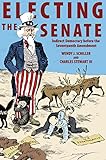Electing the Senate : indirect democracy before the seventeenth amendment / Wendy J. Schiller, Charles Stewart III.
Material type: TextLanguage: Eng Series: Princeton studies in American politics: historical, international, and comparative perspectives | Princeton studies in American politics: historical, international, and comparative perspectivesPublisher: Princeton, New Jersey : Princeton University Press, [2015]Description: xiii, 236 pages ; 25 cmISBN:
TextLanguage: Eng Series: Princeton studies in American politics: historical, international, and comparative perspectives | Princeton studies in American politics: historical, international, and comparative perspectivesPublisher: Princeton, New Jersey : Princeton University Press, [2015]Description: xiii, 236 pages ; 25 cmISBN: - 9780691163178 (paperback : acid-free paper)
- 328.73/0734 23
- JK 1965 S334e 2015
| Item type | Current library | Home library | Collection | Shelving location | Call number | Copy number | Status | Date due | Barcode |
|---|---|---|---|---|---|---|---|---|---|
 Libro
Libro
|
Biblioteca Juan Bosch | Biblioteca Juan Bosch | Ciencias Sociales | Ciencias Sociales (3er. Piso) | JK 1965 S334e 2015 (Browse shelf(Opens below)) | 1 | Available | 00000121865 |
Browsing Biblioteca Juan Bosch shelves, Shelving location: Ciencias Sociales (3er. Piso), Collection: Ciencias Sociales Close shelf browser (Hides shelf browser)

|

|

|

|
No cover image available |

|

|
||
| JK1965 .M231p 2008 | LC 89 H333e 2008 Parties and elections in America : the electoral process / | JK 1965 M231p 2012 Parties and elections in America : the electoral process / | JK 1965 R813d 2018 Democracy betrayed : how superdelegates, redistricting, party insiders, and the Electoral College rigged the 2016 election / | JK 1965 S334e 2015 Electing the Senate : indirect democracy before the seventeenth amendment / | JK 1965 S881r 2008 Reassessing the incumbency effect / | JK 1965 T627 2002 To assure pride and confidence in the electoral process / | JK 1967 F583p 1998 Political Behavior of the American electorate / |
Includes bibliographical references (pages 219-226) and index.
"From 1789 to 1913, U.S. senators were not directly elected by the people--instead the Constitution mandated that they be chosen by state legislators. This radically changed in 1913, when the Seventeenth Amendment to the Constitution was ratified, giving the public a direct vote. Electing the Senate investigates the electoral connections among constituents, state legislators, political parties, and U.S. senators during the age of indirect elections. Wendy Schiller and Charles Stewart find that even though parties controlled the partisan affiliation of the winning candidate for Senate, they had much less control over the universe of candidates who competed for votes in Senate elections and the parties did not always succeed in resolving internal conflict among their rank and file. Party politics, money, and personal ambition dominated the election process, in a system originally designed to insulate the Senate from public pressure. Electing the Senate uses an original data set of all the roll call votes cast by state legislators for U.S. senators from 1871 to 1913 and all state legislators who served during this time. Newspaper and biographical accounts uncover vivid stories of the political maneuvering, corruption, and partisanship--played out by elite political actors, from elected officials, to party machine bosses, to wealthy business owners--that dominated the indirect Senate elections process. Electing the Senate raises important questions about the effectiveness of Constitutional reforms, such as the Seventeenth Amendment, that promised to produce a more responsive and accountable government. "-- Provided by publisher.


There are no comments on this title.